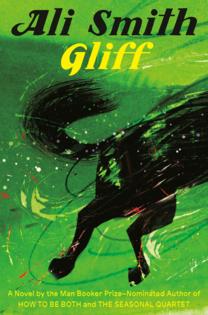Review: In Ali Smith's 'Gliff,' siblings try to survive in a dystopian near-future
Published in Books News
How do we find meaning when new boundaries are drawn between us every day?
This is a central question facing two children who find themselves on their own, fighting for survival under a surveillance state in Ali Smith’s newest, “Gliff.”
“Gliff” deals with similar themes to the four-time Booker Prize shortlisted author’s Seasonal Quartet, with central characters who are figuring out how to live in the modern world. And “Gliff” is similarly filled with the wordplay Smith is perhaps most famous for. Still, “Gliff,” which blends the speculative, literary and dystopian, feels chilling and fresh.
The novel is set in a fever dream of a dystopian near-future. Though no year is specified, modern favorites like Taylor Swift’s “Shake it Off” are referred to as old songs of a bygone era. Seemingly, almost anything can lead a person to become a societal outcast, or an “unverifiable,” from making statements critiquing the state, or referring to something as genocide or authoritarian.
Even a resistance to the reliance on social media and devices is reason enough for suspicion. There are chemicals that could kill people in the water and people roam the streets with devices on their wrists that record everything. References to Aldous Huxley’s “Brave New World” are sprinkled throughout the text, where citizen authorities are tasked with questioning others, demanding various information about political views, most recent blood test results or belief in climate change.
One day, siblings Briar and Rose find their house circled in red paint, representing suspicion from the state, while their mother is off working a hotel job. They are temporarily in the care of their mother’s boyfriend, but when they flee and once again wake to more red paint around the family camper van, the siblings are left alone to squat in an abandoned house with 42 canned meals and a fistful of cash between them.
Left to their own devices, the children become preoccupied with survival as they ration out canned meals in their cold, temporary housing. Younger sister Rose falls in love with a horse that lives in a field nearby, marked for the slaughterhouse. While out on a fact-finding mission, Briar — who is older and nonbinary — takes an interest in an elderly woman who is resisting the regime.
Rose names her favorite of the horses in the field “Gliff” (“Glyph” is the title of the forthcoming second book in Smith’s duology). At first Briar is a bit skeptical of Rose’s interest in the gray gelding. But when Briar gets their first look at an expansive dictionary, they learn that “gliff” is a Scottish word with so many meanings that it is deemed almost meaningless, though some definitions include: “An impulse. An instant. An unexpected view of something that startles you.”
The siblings' fascination with the horse is what makes the otherwise dark story of two of the world’s many abandoned children take on a fairy tale-like quality.
While this absurdly timely novel has mostly bad things to say about the state of the world, it encourages the reader to push back the despair and rise to meet a future that feels all too close.
____
Gliff
By: Ali Smith.
Publisher: Pantheon, 288 pages, $28.
©2025 The Minnesota Star Tribune. Visit at startribune.com. Distributed by Tribune Content Agency, LLC.
















Comments